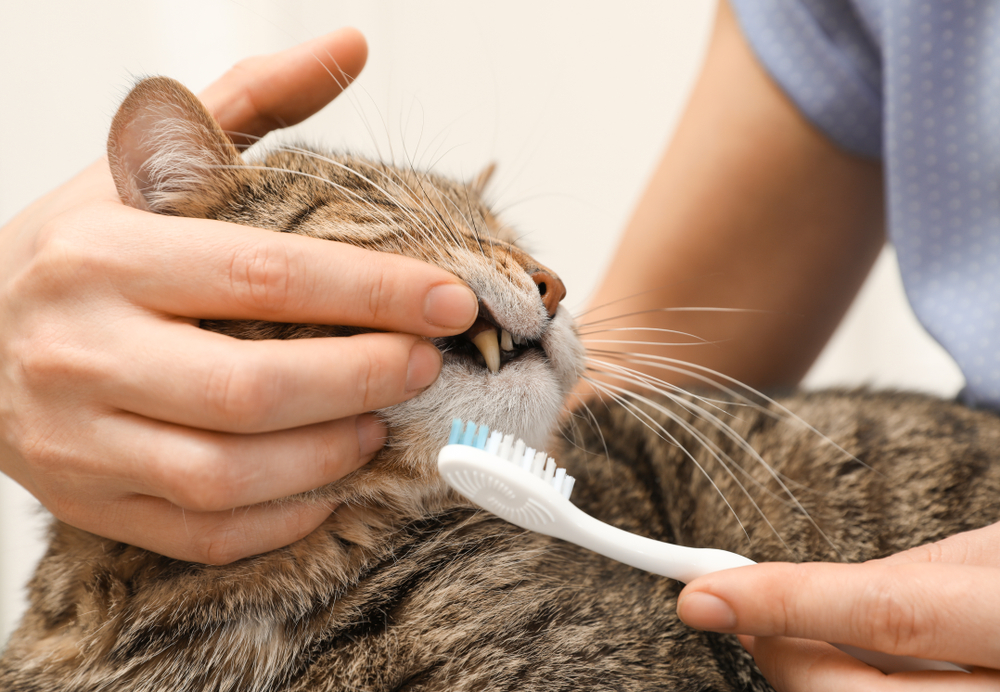Ignoring any aspect of your pet’s care can lead to substantial treatment expenses to restore their comfort and health. Dental care is the best example—left untreated, dental disease can invade every part of your pet’s body and cause not only loose teeth, tooth-root abscesses, and jawbone loss, but also systemic infection, heart damage, and kidney and liver disease. To minimize the potential for a hefty dental care bill—and to prevent your pet’s pain and suffering—brush up on these tips from Tamberley Animal Hospital to care for your furry pal’s teeth.
#1: Pick safe chew toys for your pet
Abrasive chewing action can help scrape away plaque and tartar, but the wrong type of chew toy can do more harm than good. Avoid these popular, yet dangerous, chew toys:
- Bones, hooves, and antlers — These durable chews are popular choices for aggressive chewers, but when the item is as strong as your pet’s teeth, the teeth often lose. Many dogs break their large premolars and require extractions after gnawing on these rock-hard chews, which are best avoided.
- Rawhides — A treat and entertainment in one, rawhides are commonly given to dogs, but they contain a multitude of ingredients that can make your pet sick. Rawhides are actually bleached animal skin, high in fat, that become slippery and malleable when chewed. If your dog swallows a large chunk, the rawhide piece will likely become stuck in their gastrointestinal tract and require surgical removal.
- Tennis balls — Tennis balls are a great fetch toy, but if your pet chews extensively on the wet felt, they can damage their teeth. Also, dirty tennis balls can quickly erode enamel, leaving the tooth’s sensitive pulp exposed.
Safe chew toy options include rubber Kong toys, Goughnuts toys with a safety indicator, approved dental chews, and tough fabric chew toys made from materials like fire hoses. However, although these chew toys are much less likely to damage your pet’s teeth, all chewy treats and toys pose a risk, so monitor your pet closely to ensure they do not bite off toy pieces, or swallow them whole.

#2: Tackle your pet’s dental care at home
You don’t depend on your dentist to keep your teeth clean and healthy and not brush regularly at home, and your pet needs the same treatment. Daily dental care, which is the best way to preserve your four-legged friend’s oral health between professional dental cleanings, is simple.
Incorporate dental care into your pet’s daily schedule by:
- Brushing teeth daily
- Offering dental chews and treats
- Adding enzymatic oral health products to food and water
- Spraying, rinsing, or wiping the oral cavity
- Switching to a prescription dental health diet
If you can’t brush your pet’s teeth daily, aim for at least three times a week, and provide other dental care daily in the form of chews, treats, or additives. Plaque forms on teeth in the first 24 hours after eating, and turns into tartar after 72 hours, and removing tartar before it hardens is critical for preserving your pet’s dental health.
#3: Choose the most effective dental health products for your pet
When planning your pet’s dental care regimen, search for products that can effectively combat dental disease. Dental chews and enzymatic cleaners added to food and water can help reduce oral bacteria, but ensure you choose products that give you the most bang for your buck. To ensure you select products that effectively slow plaque and tartar accumulation, look for the Veterinary Oral Health Council (VOHC) seal of acceptance on the packaging. The VOHC approves only products proven to reduce dental disease, which many dental products cannot claim.
#4: Schedule professional dental care for your pet at the first dental disease sign
Since painful, uncomfortable pets are so stoic, dental disease can progress to a severe stage before their oral pain stops them from eating. Dental disease that has progressed to that point almost guarantees that your pet will require extensive dental work and oral surgery to remove diseased and damaged teeth and tissue.
Instead, schedule regular professional dental cleanings for your pet. Most pets require annual cleanings, although some health conditions predispose pets to more serious periodontal problems that need more frequent cleanings. Monitor your pet’s oral health at home, and schedule professional dental care at the first hint of a problem. Early dental disease signs in pets include:
- Bad breath
- Brown or yellow tartar buildup
- Red, swollen, or bleeding gums
When pets chew on toys, their gums may bleed, so watch their behavior closely for oral pain signs.
Early preventive care is the best way to avoid hefty costs associated with advanced disease, plus your pet stays happy, healthy, and pain-free. Give our Tamberly Animal Hospital team a call to schedule your pet’s routine professional dental cleaning.







Leave A Comment